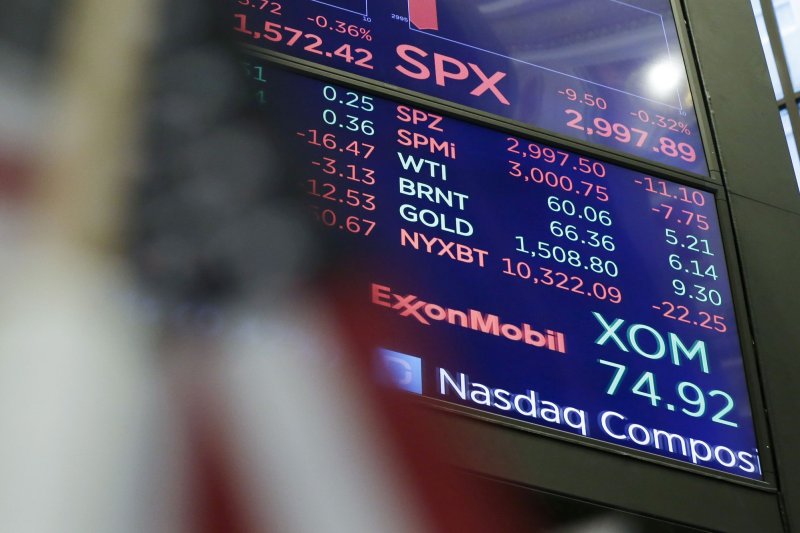1 of 5 | Shares of Exxon Mobile were up after the opening bell Monday on the the floor of the New York Stock Exchange on Wall Street in New York City. Oil prices soared after attacks in Saudi Arabia. Photo by John Angelillo/UPI |
License Photo
Sept. 16 (UPI) -- Weekend drone strikes on Saudi Arabia's oil infrastructure have effectively wiped out about 5 percent of the global daily production, sending oil prices skyrocketing to historic levels Monday.
Brent prices were up to $66.70 a barrel -- while the U.S. benchmark, West Texas Intermediate, also climbed to $63.11. In London, prices for Brent, the international benchmark for crude oil, jumped $12 a barrel, the largest increase since the late 1980s.
U.S. President Donald Trump met Monday with top administration officials at the White House to discuss how to respond.
"Remember when Iran shot down a drone, saying knowingly that it was in their 'airspace' when, in fact, it was nowhere close. They stuck strongly to that story knowing that it was a very big lie," he tweeted. "Now they say that they had nothing to do with the attack on Saudi Arabia. We'll see?"
Later in the day Trump said it appears Iran was behind the attack, adding that the United States was having some "very strong studies done" to determine who the culprit was.
"It's certainly looking that way at this moment. And we'll let you know. As soon as we find out definitively, we'll let you know. But it does look that way," he said.
The president added he does not want war with Iran, but boasted that the United States has the "strongest military in the world."
"I don't want war with anybody. But we're prepared more than anybody," he said.
Trump also declared that he has not promised Saudis protections and said they may have to pay for protection.
"The Saudis are going to have a lot of involvement in this if we decide to do something. They'll be very much involved and that includes payment and they understand that fully," he said.
The attacks at an oil processing facility at Abqaiq and an oil field at Khurais on Saturday knocked out nearly 6 million barrels of daily crude production, officials said. A fleet of 10 unmanned aerial vehicles were used in the attack.
The Iranian-supported Houthi rebel group in Yemen claimed responsibility. Monday, the group threatened more attacks. U.S. Secretary of State Mike Pompeo, however, said there is "no evidence the attacks came from Yemen."
A Saudi military spokesman said Monday a preliminary investigation showed the weapons used against the facilities were Iranian. Col. Turki al-Malki said the attacks didn't originate in Yemen and the investigations were underway to determine where they originated.
The Iran-backed Houthis threatened additional attacks against Aramco, the Saudi-owned oil company.
"We assure the Saudi regime that our long hand can reach wherever we want, and whenever we want," Houthi spokesperson Yahya Saree said, adding that the drones used in the attack were modified with jet engines.
"This attack has material implications for the oil market, as a loss of 5 million barrels per day of supplies from Saudi Arabia cannot be met for long by existing inventories and the limited spare capacity of the other OPEC+ group members," Wood Mackenzie executive Alan Gelder said. "A geopolitical risk premium will return to the oil price."
The oil supply disruption is greater than that of the Iranian Revolution in 1979, the Arab-Israeli War from in 1973 and the Iraqi invasion of Kuwait in 1990 -- all three of which led to major energy crises. Analysts say the attack could also influence crude prices well into next year, as the risk premium gets built into the price.
Abqaiq is the world's largest oil processing facility and crude oil stabilization plant.
Trump also touted the success of the U.S. energy industry.
"Because we have done so well with energy over the last few years (thank you, Mr. President!), we are a net energy exporter, & now the number one energy producer in the world," he wrote. "We don't need Middle Eastern oil & gas, & in fact have very few tankers there, but will help our Allies!"















